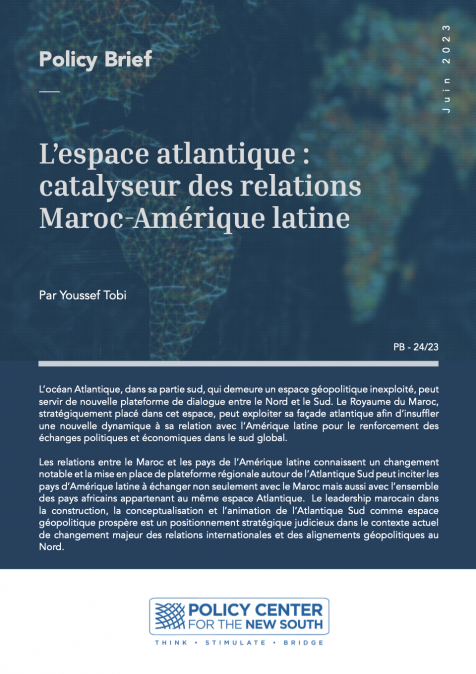Is Brazil back? The question arises from the promise made by president Lula, upon his re-election, that his country would make a return to international affairs, after years of relative isolation during the Bolsonaro administration. While the personality of Lula can play a key role in boosting Brazil’s international profile, some questions remain on the country’s ability to maintain its standing. One of them lies in the strong internal polarization within the country. Pedro Vormittag, chief of staff to the chairman of the Brazilian Center of International Relations and member of the ADEL 2023 cohort, explores some of these issues in this interview.
RELATED CONTENT
-
by Hala Boumaiz & Len IshmaelSeptember 01, 2023In this podcast, we are joined by Dr. Len Ishmael, editor and co-author of the book “Aftermath of War in Europe: The West VS. the Global South?”. Dr. Ishmael delves into the groundbreakin ...
-
 AuthorsAugust 29, 2023At the August 22-24 BRICS summit in Johannesburg, the leaders of Brazil, Russia, India, China and South Africa said they wanted to use more of their national currencies for cross-border payments, which are currently dominated by the U.S. dollar and other global convertible currencies. Like China and the other BRICS, several other countries have also sought to develop alternative external payment mechanisms. Pairs of countries have agreed to settle commercial and financial transactio ...
AuthorsAugust 29, 2023At the August 22-24 BRICS summit in Johannesburg, the leaders of Brazil, Russia, India, China and South Africa said they wanted to use more of their national currencies for cross-border payments, which are currently dominated by the U.S. dollar and other global convertible currencies. Like China and the other BRICS, several other countries have also sought to develop alternative external payment mechanisms. Pairs of countries have agreed to settle commercial and financial transactio ... -
Hamza M’jahed and Elena Sanchez-MontijanoJune 09, 2023In this podcast episode, we delve into the complex and diverse topic of migration and integration in Atlantic Latin America. As we explore the historical events and patterns of migration ...
-
AuthorsJune 2, 2023L’océan Atlantique, dans sa partie sud, qui demeure un espace géopolitique inexploité, peut servir de nouvelle plateforme de dialogue entre le Nord et le Sud. Le Royaume du Maroc, stratégiquement placé dans cet espace, peut exploiter sa façade atlantique afin d’insuffler une nouvelle dynamique à sa relation avec l’Amérique latine pour le renforcement des échanges politiques et économiques dans le sud global. Les relations entre le Maroc et les pays de l’Amérique latine c ...
-
Hamza M’jahed & Bruno TheodoroMay 26, 2023In this episode, we go beyond the surface and explore the historical background and significant milestones that have shaped the interactions between Latin America and the European Union. ...
-
Gerardo Maldonado & Mohamed BrickMay 12, 2023The term "Atlantic matter" refers to the geopolitical and economic significance of the Atlantic Ocean and its surrounding regions, including Latin America, Africa, and Europe. The podcast ...
-
Zineb Fathi & Paolo MagriFebruary 17, 2023In this episode, Paolo Magri delves into the evolving role of Brazil, Russia, India, China, and South Africa in a world of changing geopolitical landscapes. Over the course of this podca ...
-
 AuthorsAhmed Rachid El-KhattabiAlessandro Minuto-RizzoAmaye SyHamza Rkha ChahamIan O. LesserJorge CastañedaMoubarack LoUmberto ProfazioDecember 14, 2022This ninth edition of “Atlantic Currents” appears in an international context marked predominantly by a ten month-war between Russia and Nato members that began February 2022. The war is affecting not only the European and American member States directly and actively involved in an unprecedented manner, but more importantly the countries of the global South that have suffered collateral damage. Indeed, the nations of the world were barely out of the most painful and costly phase o ...
AuthorsAhmed Rachid El-KhattabiAlessandro Minuto-RizzoAmaye SyHamza Rkha ChahamIan O. LesserJorge CastañedaMoubarack LoUmberto ProfazioDecember 14, 2022This ninth edition of “Atlantic Currents” appears in an international context marked predominantly by a ten month-war between Russia and Nato members that began February 2022. The war is affecting not only the European and American member States directly and actively involved in an unprecedented manner, but more importantly the countries of the global South that have suffered collateral damage. Indeed, the nations of the world were barely out of the most painful and costly phase o ... -
AuthorsMarch 11, 2022The pros and the cons of regional market integration are well exemplified by the experience of Uruguay, a small, open economy in MERCOSUR, which is a highly protectionist trade bloc, dominated by Argentina and Brazil. With access to such large markets, Uruguay did raise its growth rate during the first decade of MERCOSUR, the 1990s. However, market integration as implemented in MERCOSUR was also problematic in that Uruguay suffered from the high protectionism of Argentina in the for ...
-
AuthorsMarch 8, 2022The contrast between Argentina’s rich natural resource endowment and its poor economic performance has been the focus of much socio-political and economic analysis. When it created MERCOSUR with its immediate neighbors, Brazil, Uruguay, and Paraguay in 1991, it had access to a trading bloc with a combined GDP of US$ 419 trillion (2019), making it the 5th largest economy in the world. Joining the MERCOSUR was a break from its protectionist past. But it did not last. Argentina greatl ...





